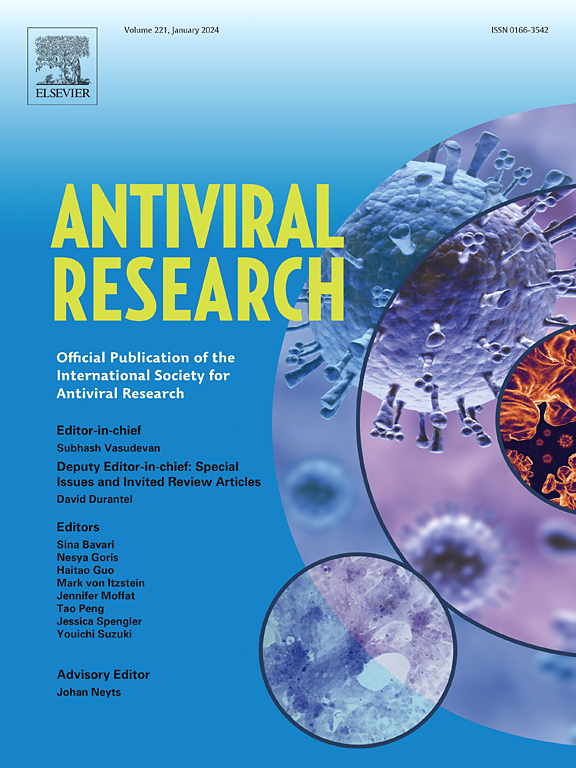胆固醇25-羟化酶通过其结构损伤和阻断HN蛋白抑制新城疫病毒复制。
IF 4.5
2区 医学
Q1 PHARMACOLOGY & PHARMACY
引用次数: 0
摘要
胆固醇25-羟化酶(CH25H)是一种膜结合的内质网蛋白,可将胆固醇转化为25-羟基胆固醇(25HC)。最近的研究表明,CH25H是一种干扰素刺激基因(ISG),有助于对抗各种病毒,具有广泛的抗病毒作用。然而,鸡CH25H (chCH25H)在控制新城疫病毒(NDV)感染和复制中的作用仍未被探索。本研究探讨了chCH25H对鸡胚成纤维细胞感染新城疫的影响。结果表明,在病毒感染后,细胞试图暂时上调chCH25H的表达。此外,chCH25H的过表达减少了NDV在细胞中的感染,而内源性chCH25H水平的降低增加了其复制。此外,用25HC (chCH25H的一种活性代谢中间体)处理细胞和病毒,通过阻止病毒进入细胞显著减少NDV复制,同时对病毒结构造成显著的结构损伤。此外,鸡蛋实验结果还表明,用脂多糖(LPS)处理鸡蛋,chCH25H和25HC的正调节因子,导致病毒大量减少。这些结果表明,chCH25H和25HC对NDV在鸡成纤维细胞中的复制具有抑制作用。本文章由计算机程序翻译,如有差异,请以英文原文为准。
Cholesterol 25-hydroxylase inhibits Newcastle disease virus replication by its architectural damage and blocking HN protein
Cholesterol 25-hydroxylase (CH25H) is a membrane-bound endoplasmic reticulum protein that converts cholesterol into 25-hydroxycholesterol (25HC). Recent studies showed that CH25H is an interferon-stimulated gene (ISG) that helps fight various viruses and has broad antiviral effects. However, the role of chicken CH25H (chCH25H) in controlling Newcastle disease virus (NDV) infection and replication remains unexplored. This study examined the impact of chCH25H on NDV infection in chicken embryo fibroblast cells. The results showed that cells try to upregulate the chCH25H expression temporally upon viral infection. Moreover, the overexpression of chCH25H reduced NDV infection in cells while reducing endogenous chCH25H levels increased its replication. Additionally, treating cells and viruses with 25HC, an active metabolic intermediate of chCH25H, significantly reduced NDV replication by blocking the virus from entering cells while causing significant structural damage to the virus architecture. In addition, in ovo results also exhibited that the eggs treated with lipopolysaccharides (LPS), a positive regulator of chCH25H and 25HC, resulted in extensive viral reduction. These findings indicate that chCH25H and 25HC are against NDV replication in chicken fibroblast cells.
求助全文
通过发布文献求助,成功后即可免费获取论文全文。
去求助
来源期刊

Antiviral research
医学-病毒学
CiteScore
17.10
自引率
3.90%
发文量
157
审稿时长
34 days
期刊介绍:
Antiviral Research is a journal that focuses on various aspects of controlling viral infections in both humans and animals. It is a platform for publishing research reports, short communications, review articles, and commentaries. The journal covers a wide range of topics including antiviral drugs, antibodies, and host-response modifiers. These topics encompass their synthesis, in vitro and in vivo testing, as well as mechanisms of action. Additionally, the journal also publishes studies on the development of new or improved vaccines against viral infections in humans. It delves into assessing the safety of drugs and vaccines, tracking the evolution of drug or vaccine-resistant viruses, and developing effective countermeasures. Another area of interest includes the identification and validation of new drug targets. The journal further explores laboratory animal models of viral diseases, investigates the pathogenesis of viral diseases, and examines the mechanisms by which viruses avoid host immune responses.
 求助内容:
求助内容: 应助结果提醒方式:
应助结果提醒方式:


